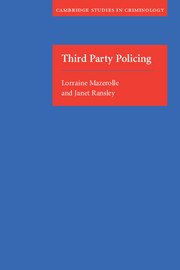Book contents
- Frontmatter
- Contents
- List of tables
- Acknowledgments
- 1 Governance, risk and crime control
- 2 Policing and the new regulatory state
- 3 Dimensions of third party policing
- 4 In the shadow of the law
- 5 Controlling drug problems
- 6 Controlling crime problems
- 7 Equity, side effects and accountability
- 8 Directions for the future
- Notes
- References
- Index
5 - Controlling drug problems
Published online by Cambridge University Press: 22 September 2009
- Frontmatter
- Contents
- List of tables
- Acknowledgments
- 1 Governance, risk and crime control
- 2 Policing and the new regulatory state
- 3 Dimensions of third party policing
- 4 In the shadow of the law
- 5 Controlling drug problems
- 6 Controlling crime problems
- 7 Equity, side effects and accountability
- 8 Directions for the future
- Notes
- References
- Index
Summary
Measuring program performance and being able to say whether or not an intervention (e.g. third party policing) works is the bread and butter of sound policy decision-making. These days we use performance measurement for “evidenced-based policy making” or making policies based on the outcomes of well-designed and executed evaluations. In the policing arena, Sherman (1998) draws analogies with “evidence-based medicine” and defines evidenced-based policing as the use of the best available research on the outcomes of police work to implement guidelines and evaluate agencies, units and officers. In short, evidenced-based policing “… uses the best evidence to shape the best practice” (Sherman, 1998: 4).
Four categories are generally used to gather evidence and measure program performance: effectiveness, efficiency, equity and accountability. Effectiveness concerns the extent to which an objective is achieved, regardless of cost or other factors. Efficiency addresses the relationship between the cost of a program and its effectiveness (e.g. the cost of the third party policing intervention per unit of crime that is reduced). Equity (or fairness) concerns the distribution of benefits and costs. Accountability requires that the program, the intervention staff (e.g. the police) and the program participants act within the constraints set by duly constituted authority. In this chapter, we are concerned with assessing the effectiveness of third party policing initiatives aimed at drug problems.
- Type
- Chapter
- Information
- Third Party Policing , pp. 98 - 127Publisher: Cambridge University PressPrint publication year: 2006

